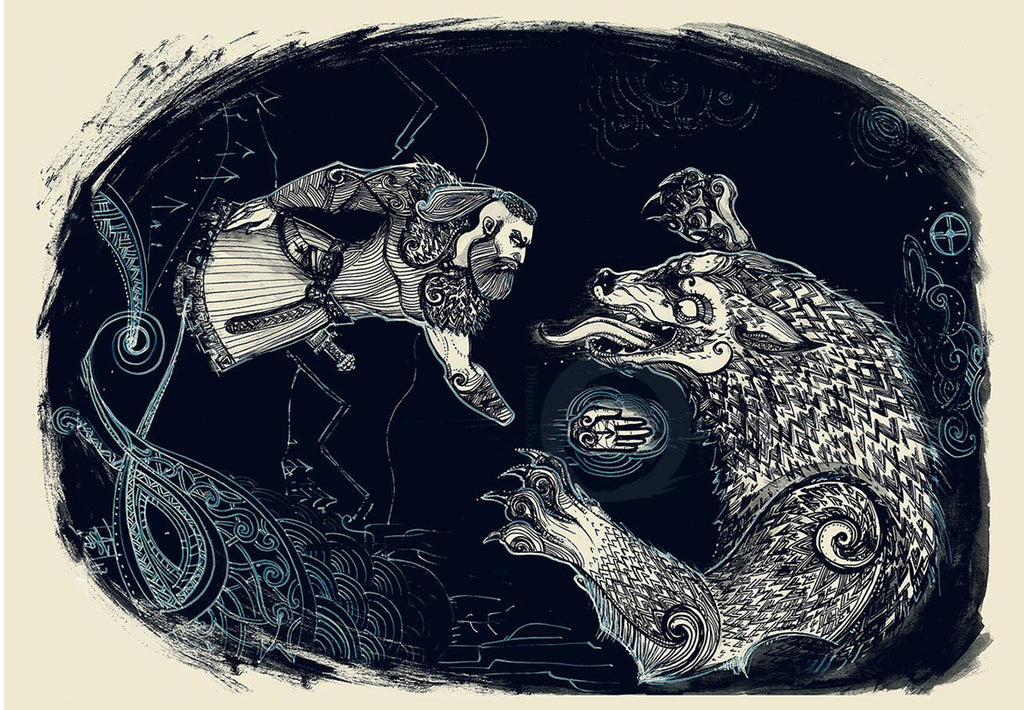Who Is God of Sacrifice in Norse Mythology?
Each god in Norse mythology is in possession of some valuable qualities that all of us wish to have in life. Some of them might be courage, physical strength, wisdom, longevity, etc. But often, hardly are those qualities used for the good of the whole community. Yet, there was one god who always prioritized the goodness of his clan. It was Tyr whom we always regard as God of Justice and War. Looking further, Tyr was also a god of Sacrifice.
Who was Tyr?
Tyr was one of a big figure in Norse mythology and the Viking Age as well. But the truth is, Tyr is not a common god in modern times. This might be because he doesn't appear in any blockbuster. But nothing could replace his importance back in his time.
There were three gods of war in Norse mythology: Odin, Thor, and Tyr. While Odin was god of military strategy, Thor was god of physical strength in battle, Tyr was god of justice in war.

Tyr god of justice and honor in Norse mythology
Many scholars believed that, back in the Viking Age, Tyr had a dominant role which was sometimes even more powerful than Odin the Allfather. But as time passes by, Odin becomes more popular and Norse mythology is an Odin-revolved story.
Tyr often appeared to be a one-handed god and his other hand would wield a sword the symbol of honor and power.
The reason why Tyr was one-handed was the answer to his title "God of Sacrifice".
Nothing great was ever accomplished without making a sacrifice
Odin the Allfather was the ruler of Asgard and he was among those who knew the fates of gods. Odin realized that to prevent days of Ragnarok, he had to prevent the children of Loki from forming a strong ally. Odin then pushed each child of Loki into different worlds and Fenrir the Wolf was brought to Asgard.
Living in Asgard was never an easy task for a giant, not to say a giant who was prophesied to kill Odin. No one ever dared to approach Fenrir. Although Odin brought Fenrir to Asgard, Fenrir became an outcast in the realm of gods.
The only one who approached and fed Fenrir was Tyr.
Days by days, gods became more scared of Fenrir for he grew up with incredible speed. And that was about time to get rid of Fenrir in Asgard. However, Odin did not want to allow Fenrir to roam freely in Norse cosmos. Then came the decision that Fenrir should be bound for social security reasons.
But Fenrir was way more stronger than anyone could ever think of. He easily broke off the chains that gods used to tie him up.
It was not until the third time when the gods used a magical chain made by the dwarves to bind Fenrir.
But Fenrir was so smart that he refused to try this chain. He did smell a rat when seeing the gods tried to tie him with a thin chain. Fenrir said that if gods wanted him to try the chain, they had to promise to let him go if he failed to break off the chain. And Fenrir had a word from the gods. A promise weighed as much as the honor of the gods' community. But Fenrir also wanted a god to put a hand inside Fenrir's mouth.
Obviously, no one dared to approach him, not to mention putting a hand. The only one who volunteered was Tyr.
Tyr put his hand inside Fenrir's mouth and the gods started to try the chain on the wolf. Much to Fenrir's shock, he could not break out of the chain. And Fenrir could not even believe that it was a trick by gods who showed no sign that they were about to release Fenrir.
As quick as a lightning, Fenrir bit off the hand of Tyr leaving this god in blood and pain. But the bite could change nothing. Because Fenrir was finally bound to the rock somewhere only gods knew. There, he lay until the days of Ragnarok broke in the sky.
Many things just came out from this piece. But all should be focused was the sacrifice of Tyr.

The binding of Fenrir
Many sacrifices were seen in Norse mythology and many of them were made by Odin the Allfather. But what was the difference between Odin and Tyr?
While Odin sacrificed to get something better for himself, Tyr did it to get something better for the clan.
Needless to say, it was good to see someone make a sacrifice to get what they want. But it was far better to see someone sacrifice to better the whole community.
Obviously, Tyr could get rid of the bite. But he chose to lose a hand for the sake of his fellows. Tyr must have been ashamed by the oath-breaking deed by the gods. As mentioned, a promise must never be broken in Norse society. But the gods failed to keep it and Tyr must do something to get back the honor for his community.
From another viewpoint, many agreed that Tyr pitied Fenrir who was treated unfairly since birth. After all, Fenrir had done nothing harmful to the community of gods. But no one showed him a sign of kindness in Asgard.
Put this in the modern sense, it is Tyr who chooses to serve his people. Although his reputation has already faded now, what he had in the myth forever stays for any Norse enthusiasts.
Tyr's story is the best example of the importance of serving people. "Only a life lived in the service of others is worth living."




